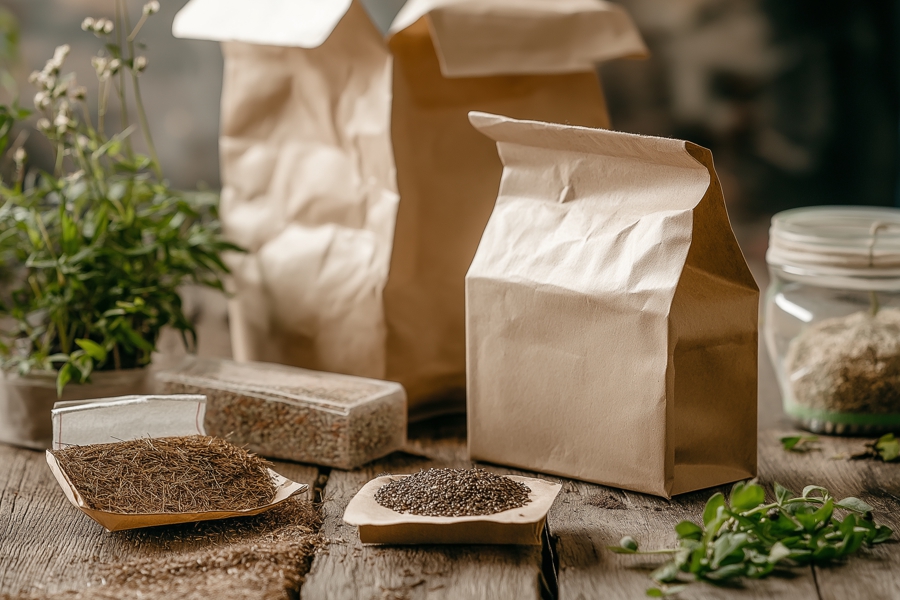Understanding Biodegradable Packaging Materials in the Packaging Industry

Biodegradable packaging materials have become a focal point in the packaging industry, offering an eco-friendly alternative to traditional packaging options like plastics and foils. These materials are designed to break down naturally in the environment, reducing the long-term impact of packaging waste. As concerns over plastic pollution and environmental sustainability continue to grow, biodegradable packaging has emerged as a crucial component of the industry's efforts to minimise its ecological footprint.
What Are Biodegradable Packaging Materials?
Biodegradable packaging materials are substances that can be decomposed by natural processes, typically by microorganisms like bacteria and fungi. Unlike conventional plastics, which can take hundreds of years to degrade, biodegradable materials break down into natural elements like carbon dioxide, water, and biomass within a much shorter timeframe. This breakdown process significantly reduces the accumulation of waste in landfills and the environment.
These materials can be made from a variety of sources, including plant-based materials like starch, cellulose, and polylactic acid (PLA), as well as certain types of bioplastics. Some biodegradable materials are also compostable, meaning they break down into non-toxic, soil-enriching substances under specific conditions, further enhancing their environmental benefits.
Types of Biodegradable Packaging Materials
There are several types of biodegradable packaging materials currently used in the industry:
- Starch-Based Plastics: Derived from corn, potato, or wheat starch, these plastics are often used as a substitute for conventional plastic in packaging applications. They are biodegradable and can be composted under the right conditions, making them an excellent choice for food packaging.
- Polylactic Acid (PLA): PLA is a biodegradable polyester derived from renewable resources like corn starch or sugarcane. It is commonly used in the production of packaging films, containers, and compostable bags. PLA is known for its transparency and strength, making it a versatile material for various packaging needs.
- Cellulose-Based Packaging: Cellulose is an organic compound found in plant cell walls. It can be processed into films and coatings that are both biodegradable and compostable. Cellulose-based packaging is often used for wrapping food products, providing a breathable barrier that helps preserve freshness.
- Biodegradable Paper and Cardboard: Made from natural fibres, biodegradable paper and cardboard are widely used in packaging. They can be coated with biodegradable polymers to enhance their moisture resistance, making them suitable for various applications, including food packaging and shipping materials.
Advantages of Biodegradable Packaging Materials
One of the primary advantages of biodegradable packaging materials is their reduced environmental impact. Since these materials can break down naturally, they help to alleviate the problem of plastic pollution and reduce the burden on landfills. By choosing biodegradable packaging, companies can contribute to a more sustainable future and meet consumer demands for environmentally responsible products.
Biodegradable packaging materials also offer functional benefits. Many biodegradable plastics, such as PLA, provide similar performance characteristics to conventional plastics, including durability and barrier properties. This means they can be used in a wide range of applications, from food packaging to product containers, without compromising on quality or functionality.
Furthermore, the use of biodegradable packaging can enhance a brand's image and reputation. Consumers are increasingly seeking out products that are packaged sustainably, and adopting biodegradable materials can position a brand as environmentally conscious and forward-thinking. This can lead to increased customer loyalty and a competitive edge in the market.
Challenges and Considerations
While biodegradable packaging materials offer significant environmental benefits, they also come with certain challenges. One of the main challenges is the need for specific conditions to facilitate biodegradation. For instance, some biodegradable plastics require industrial composting facilities to break down efficiently, as they need higher temperatures and controlled environments than what is typically found in home compost bins or natural settings.
Additionally, the production of some biodegradable materials, such as PLA, relies on agricultural resources like corn and sugarcane. This raises questions about land use and the impact on food supply, especially if large-scale production competes with food crops for agricultural land.
Cost is another consideration. Biodegradable packaging materials can be more expensive to produce than conventional plastics, which can affect pricing and market competitiveness. However, as technology advances and demand increases, the cost of biodegradable materials is expected to decrease over time.
Future Trends in Biodegradable Packaging
The future of biodegradable packaging materials is likely to be shaped by ongoing research and innovation. Scientists are exploring new sources of biodegradable materials, such as algae and fungi, which could provide more sustainable and efficient options. There is also a focus on developing materials that can biodegrade in natural environments, including oceans, to address the issue of marine plastic pollution.
Another trend is the integration of smart packaging technologies with biodegradable materials. This includes the development of bio-based sensors that can monitor the freshness of perishable goods or indicate when a product has reached the end of its shelf life. These innovations not only enhance the functionality of packaging but also contribute to waste reduction by helping consumers make informed decisions about product use.
Summary
Biodegradable packaging materials represent a significant step towards more sustainable packaging solutions. By offering an eco-friendly alternative to traditional plastics, they help reduce the environmental impact of packaging waste and contribute to a circular economy. As technology and consumer awareness continue to evolve, biodegradable packaging is poised to play an increasingly important role in the packaging industry.
Jacob White Packaging supports the use of sustainable and innovative packaging solutions, offering expertise and guidance to businesses looking to enhance their packaging practices. Our commitment to quality and sustainability ensures that your packaging meets the highest standards of environmental responsibility and product protection.
If you are exploring sustainable packaging options for your business, Jacob White Packaging offers expert consultation and tailored solutions. Contact us today to learn how we can support your packaging needs.

